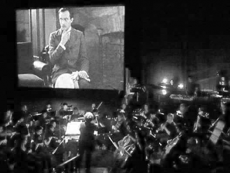
The film industry is one of the biggest industries in the world, completely saturating the mainstream culture of most societies. However, when we think of film, we do not typically associate with Opera. Opera to many still remains an inaccessible art form, reserved for the socially elite, perhaps partially down to the price of seeing such shows, whereas a film ticket is substantially cheaper. However, it is undeniable that modern film has derived a great deal from classical opera, even if the similarities are not immediately obvious. The most obvious debt film has to Opera is its use of music. This seems a standard feature of films that we would not question, however its use has changed greatly over time, due to some critics questioning whether music has a role within film at all; ‘Do films really need music?... Hans Erdmann and Giuseppe Becce, both experienced composers, approach the question directly. First they observe that music is not generally considered a part of the production process of a film.’ Generally, nowadays, I think we would not question the pivotal role of music in a film, with some of the best loved music being film scores from celebrated composers such as Howard Shore and Hans Zimmer. However, had it not been for Opera, film today would be very different.
It is no secret that the film industry began with producing ‘silent’ films, with not only no audible speech, but no music either. In order to combat this, theatres would employ a pianist to play music at certain points, and larger theatres if financially able, would eventually employ not just a pianist but sometimes a small orchestra for a better cumulative effect. However, the problem with this, is that the music performed was either from a selected repertoire of classical music, or it was improvised. As such, the cohesion with film was limited to the ability of the musician, or the pieces selected. After all, how effective can music truly be for a film when it has not been specifically devised for the film? Erdmann and Becce ‘draw a parallel between the evolution of film toward the status of art (Kuntsfilm) and a simultaneous movement away from an indiscriminate, unfocused musical accompaniment (which they associate with coffeehouse entertainment) toward a music well synchronized in effect and connotation.’
Opera has by contrast always utilized music for its dramatic effect, tailoring each piece to demonstrate the drama written into the lyrics and/or the scene. For example, the wonderful opera ‘Faust,’ by Charles Gounod, has a particularly powerful and appropriate score. At the end of Act 4, we see Marguerite in a Church, praying for salvation, having been condemned to Hell by her own brother. A diminished and dissonant sustained chord played on an Organ begins the accompanying piece of music. Here, Gounod has effectively used the concept of diagetic sound; an Organ is a common feature of a Church, and the audience can likely see it, so are not guessing where the sound is originating from, however the power of the instrument can be magnified; some performances have the Organ overcast in shadows, so it is impossible to see anybody actually playing it, subsequently creating a very tense atmosphere. As the chord fades, a rich string section can be heard, crescendoing, with a real sense of urgency conveyed due to the staccato rhythms in the minor key, with an initial steady rise in tempo. Marguerite’s voice mimics the strings, sustaining and thus placing emphasis on the same notes, reaching a high trilling note, before the sudden introduction of Mephistophiles.
Upon Mephistophiles’ arrival, a lush orchestration comes into play, with a thickly textured brass section, and the Organ is reintroduced, subtly implying that Mephistophiles is playing It, or in control of it, despite it being clear to the audience that he is not playing the keys despite the domineering sound being created. This very much works to show the audience Mephistophiles’ unearthly power and instills as sense of fear due to the unknown. This is in juxtaposition to how an early film would have been able to portray such a scene; the music would merely have been a stock piece, probably in a minor key with diminished chords, to add some level of tension, but would be nowhere near as effective as the carefully composed Opera score. As such, we can clearly see the progression of film owes much to Opera, as we now see composers carefully devising music for each moment of a film, thereby rendering films now capable of inducing a much greater spectrum of reactions from an audience.
Image1: http://scumcinema.com/features/10-commonly-misused-terms-in-cinema/

0 Comment:
Be the first one to comment on this article.